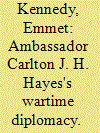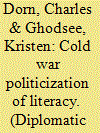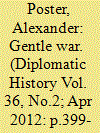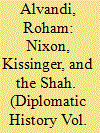|
|
|
Sort Order |
|
|
|
Items / Page
|
|
|
|
|
|
|
| Srl | Item |
| 1 |
ID:
112145


|
|
|
|
|
| Publication |
2012.
|
| Summary/Abstract |
U.S. Ambassador to Spain (1942-1945), Carlton J.H. Hayes, has been often reputed a Francoist. A look at the entire printed and archival record, however, shows Hayes to have been a tough critic of the caudillo's "fascism." This article focusses particularly on Hayes' active role in securing the passage of some 40,000 refugees-French, Anglo-Saxons, Jews and others-across the Pyrenees mostly to North Africa. In retirment, Hayes advocated patient dilomacy, rather than ostracism or subversion of Franco Spain-the policy the U.S. eventually adopted.
|
|
|
|
|
|
|
|
|
|
|
|
|
|
|
|
| 2 |
ID:
112149


|
|
|
|
|
| Publication |
2012.
|
| Summary/Abstract |
In 1947, officials at the United Nations Educational, Scientific, and Cultural Organization (UNESCO) established an unprecedented, worldwide literacy program. Simultaneously, however, officials at the World Bank refused to support educational programming, arguing that education-related projects could not guarantee a return on Bank investments. In 1962, however, World Bank lending policies began to shift. Lending for primary education increased from zero to 14 percent between 1963 and 1978 and overall Bank spending on education rose dramatically. During this same period, however, critics increasingly questioned the central principles upon which UNESCO officials established their organization's educational programming, fearing that the organization had come under communist influence. This paper reexamines the evolving priorities of United Nations organizations during the Cold War and the increasing politicization of economic development. It offers a critical reassessment of the role of the World Bank and UNESCO in negotiating the ideological conflict between capitalism and communism.
|
|
|
|
|
|
|
|
|
|
|
|
|
|
|
|
| 3 |
ID:
112146


|
|
|
|
|
| Publication |
2012.
|
| Summary/Abstract |
For almost twenty years, the so-called Red Line Agreement compelled the members of the multi-national Iraq Petroleum Company (IPC) to operate collectively within the Persian Gulf. In 1946, however, the two American members of the IPC announced that they were acquiring a 40% stake in the American-owned Arabian American Oil Company (ARAMCO), which held the most important oil concession in Saudi Arabia. The French member of the IPC (and by extension, the French Government, which was a major shareholder in the company) strongly protested, but eventually accepted a settlement that abrogated the Red Line Agreement and allowed for the expansion of ARAMCO. Although many studies have analyzed these events as an important episode in the history of the international oil industry, this article examines them within the context of U.S.-French relations and the early Cold War. It argues that the major American oil companies and the U.S. Government expended considerable effort in brokering an amicable settlement, and that the French received more favorable terms than previously assumed.
|
|
|
|
|
|
|
|
|
|
|
|
|
|
|
|
| 4 |
ID:
112150


|
|
|
|
|
| Publication |
2012.
|
| Summary/Abstract |
Alexander Poster's article, "The Gentle War: Famine Relief, Politics, and Privatization in Ethiopia-1983-1986" examines the Reagan administration's efforts to resolve Cold War disputes through humanitarian assistance. With the Vietnam War fresh in minds of both Congress and the American public, Reagan officials dealt with hesitancy when they pressed for military and developmental grants for foreign nations. M. Peter McPherson, administrator for the Agency for International Development, discovered a solution to the Reagan administration's problem. McPherson noted that Americans still supported humanitarian objectives abroad and sought to incorporate humanitarian relief into President Reagan's foreign policy strategy. The Ethiopian famine of the mid-1980s resulted in the largest mobilization of relief resources in U.S. history. The American response was both a humanitarian effort and a targeted attempt to discredit socialist dictator Mengistu Haile Mariam. American policymakers drew up their policy with the intent to strengthen rebel areas, discourage collectivization of land, and take credit for most of the relief effort. Thus, disaster relief in Ethiopia served a dual purpose: to provide humanitarian aid and to further American security interests.
|
|
|
|
|
|
|
|
|
|
|
|
|
|
|
|
| 5 |
ID:
112148


|
|
|
|
|
| Publication |
2012.
|
| Summary/Abstract |
The Nixon Doctrine marked a turning point in American strategies of containment in the Persian Gulf. Whereas Lyndon Johnson had sought to balance Iran and Saudi Arabia as the "twin pillars" of the region during the British withdrawal "east of Suez," between 1969 and 1972 Nixon gradually adopted a policy of Iranian primacy. Declining Anglo-American power does not provide an adequate explanation for this shift in U.S. Gulf policy. These constraints confronted both Johnson and Nixon, yet each president adopted quite distinct Gulf policies. Drawing on American, British, and Iranian sources, this article makes the case that the shift in U.S. Gulf policy from balancing under Johnson to Iranian primacy under Nixon reflected a change in American thinking about the shah of Iran, Muhammad Reza Pahlavi. This change in American thinking provided fertile ground for the shah's relentless efforts to secure Washington's backing for Iran's regional primacy throughout the 1970s.
|
|
|
|
|
|
|
|
|
|
|
|
|
|
|
|
| 6 |
ID:
112147


|
|
|
|
|
| Publication |
2012.
|
| Summary/Abstract |
The author revises existing historical accounts of a critical period during the Vietnam War when the North Vietnamese urgently needed economic aid from their Communist allies in order to prepare for the ambitious Tet Offensive in January 1968, and to help the DRV economy survive President Lyndon B. Johnson's bombardment of North Vietnam under Operation Rolling Thunder. Using new evidence from the archives in Hanoi, this article shows that China-not the Soviet Union-was the biggest donor of economic aid to the Democratic Republic of Vietnam (DRV, or North Vietnam) in 1967 and 1968. The new evidence suggests that American intelligence estimates of Communist bloc economic aid to the DRV were incorrect. Misled by inaccurate data, U.S. officials failed to understand the remarkable resilience of the DRV economy to survive U.S. bombardment. An accurate understanding of Communist bloc aid arrangements might have strengthened the arguments of those American officials advocating early peace negotiations with the DRV.
|
|
|
|
|
|
|
|
|
|
|
|
|
|
|
|
|
|
|
|
|